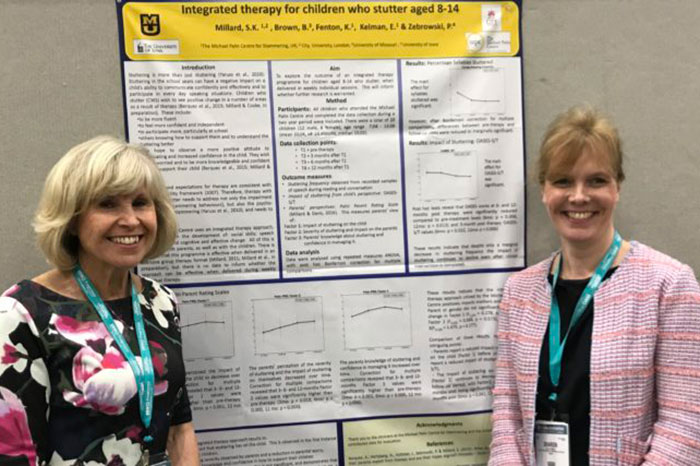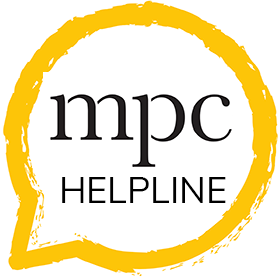
Current projects

Palin Stammering Therapy for School-Aged Children (Palin STSC(8-14)):
Currently there are no adequately researched therapies for school-aged children who stammer. This therapy programme has been developed from the work of clinicians at the Centre. It is a 10-week programme based on the Palin Model for children aged 8-14 and their parents. These topics include learning about stammering, building confidence, and helping the thoughts and feelings that children might have about stammering. The sessions are attended by the child and their parents / carers.
There are a series of studies which are focused on exploring the effectiveness of this approach at the Michael Palin Centre.
Title: Palin Stammering Therapy for School Aged Children aged 8-14: Clinical outcomes for children attending the Michael Palin Centre for Stammering
Researchers: Rosie McLean and Sharon Millard
Overview: This is an evaluation of the Palin STSC(8-14) therapy delivered at the MPC.
The families attending Palin STSC(8-14) at the Michael Palin Centre complete assessments before starting therapy, and at 3 months, 6 months and one year after starting therapy. These assessments measure:
– the outward features of stammering
– the child’s views on how much impact stammering is having on their life
– the parents’ views on the impact of stammering on their child, the amount of stammering and impact on them as parents, and their knowledge and confidence in how to support their child.
We have evaluated the assessments completed by 46 families that have attended therapy and completed most of these assessments over the year. The results from these 46 families show that the children view stammering as having a lower negative impact on their life 3 months after starting therapy, and this is maintained for the rest of the year. Parents also report that the impact on their child is reduced, the outward stammering and impact on them as parents is reduced and their knowledge and confidence about how to support their child is increased. These positive changes are made without a significant change in the child’s outward stammering as measured by the therapist.
These findings will be presented at the Oxford Stuttering and Cluttering Research conference in September 2025.
Title: Exploration of parents’ and children’s perspectives of change following Palin Stammering Therapy for School-Aged Children (Palin STSC (8-14): A Qualitative Study.
Researchers: Sarah Caughter and Martha Jeffery
Overview: We are currently in the process of data collection and analysis of semi-structured interviews with children and parents who have completed a one-year programme of Palin STSC(8-14) therapy, either in group or individual format. We are interested in participants’ perspective of change over time, and the influencing factors that may play a role in that change. We aim to complete interviews with 5 children and 5-10 parents who have completed Palin STSC(8-14) in group format and 5 children and 5-10 parents who have completed group therapy.
Whilst the Thematic Analysis is in its early stages, some interesting themes are emerging for the children around an important shift in perspective, understanding more about stammering and the value of the broader support network.
Initial findings will be presented at the Oxford Stuttering and Cluttering Research conference in September 2025.
Title: Effectiveness of Palin STSC(8-14) Delivered in a One-Week Intensive Group Therapy Format.
Researcher: Hope Kightley and Sharon Millard
Overview: The Michael Palin Centre (MPC) provides specialist intensive group therapy for children aged 10-14 and their parents. Historically, this therapy was delivered through a two-week intensive program, with follow-up sessions at 3-, 6-, 9-, and 12-months post-therapy. Partly in response to the COVID-19 pandemic, the MPC piloted a condensed one-week group program, maintaining the same follow-up schedule. The children and parents attending these courses were reporting changes very similar to those of the 2-week course and so the 1-week course continued. There are obvious accessibility and resource advantages for a 1-week course if the outcomes should prove to be similar. This new one-week program follows the Palin STSC(8-14) therapy model, a format under investigation (Millard et al., 2025).
This study aims to explore the outcomes of the 1-week and 2-week therapy programs by analysing changes in stammering-related outcomes over time and exploring whether there are differences between the two groups.
The following assessment tools are being used to evaluate therapy effectiveness:
- Palin Parent Rating Scale (Millard & Davis, 2016)
- Stuttering Severity Instrument-4 (Riley & Bakker, 2009)
- Revised Child Anxiety and Depression Scale (Chorpita et al., 2000)
- Overall Assessment of the Speaker’s Experience of Stuttering (Yaruss & Quesal, 2016)
Data are being analysed a Linear Mixed Model to explore changes over time and between groups.
Initial findings will be presented at the Oxford Stuttering and Cluttering Research conference in September 2025.
Palin Parent-Child Interaction Therapy (Palin PCI):
Title: Parents’ perspectives of change following a Palin Parent Child Interaction (Palin PCI) based parent group
Researchers: Liz Cox
Overview: Parent therapy groups for young children have been introduced at the MPC. At the start of therapy and at different follow up sessions throughout the year, parents complete the Palin Parent Rating Scales (Palin PRS). The Palin PRS measures parents’ perspectives about: 1) the impact of stammering on the child; 2) the severity of stammering and the impact on the parents; 3) the parents’ knowledge about stammering and confidence in managing it. With any service development, it is important to explore the impact that it is having. Data collection is ongoing, but preliminary analysis from 29 parents who completed the Palin PRS pre-therapy and post-therapy is underway.
These findings will help to inform services provided at the MPC going into the future.
Other studies:
Title: Developmental Stuttering: Population-Based Genetic Discovery (IRAS 271996)
Researchers: This study is being conducted collaboratively by Wayne State University, Vanderbilt University, The Michael Palin Centre (London, UK), Curtin University (Perth, AUS) and Michigan State University.
MPC Team Members Involved: Sharon Millard, Hope Kightley, Rosie McLean, Chloe Rush, Liz Cox
Overview: The Michael Palin Centre (MPC) serves as the UK host site for this international, large-scale study focused on identifying the genetics and phenotypes that explain stammering.
With an estimated 3,000 participants to be enrolled globally, this study will constitute the largest and most comprehensive genetic investigation of stammering ever performed. We are proud to have been invited to collaborate on this project.
This study is open to recruitment. We are inviting individuals who stammer, or used to stammer, to participate. The study requires a saliva sample for genetic analysis. If you would like to take part in this study and would like more information, please contact: [email protected]
Title: What do adolescents who stutter want from therapy, and are these hopes aligned with the PERMA model of wellbeing?
Researchers: Sophie Card, Sarah Caughter & Ali Berquez
Overview: Building on our studies that have explored what children and parents want from therapy, we are conducting this investigation to understand what adolescents hope to gain. At the start of therapy, people are asked about their ‘best hopes from therapy’. We are investigating what 15-18 year olds consider to be important and relevant changes that they hope to gain from attending therapy.
A reflexive thematic analysis has highlighted six themes and 18 subthemes, demonstrating that adolescents have a range of anticipated outcomes.
Findings will be presented at the Oxford Stuttering and Cluttering Research conference in September 2025.

Sometimes you just need someone to talk to


Sometimes you just need someone to talk to
Our Helpline, 020 3316 8100, is open during office hours (9am-5pm) and voicemail messages can be left when the office is closed.
“Our son has loved it!”
Become a Friend
Receive emails with news and information about the Centre's work, events, and fundraising.
Sign up